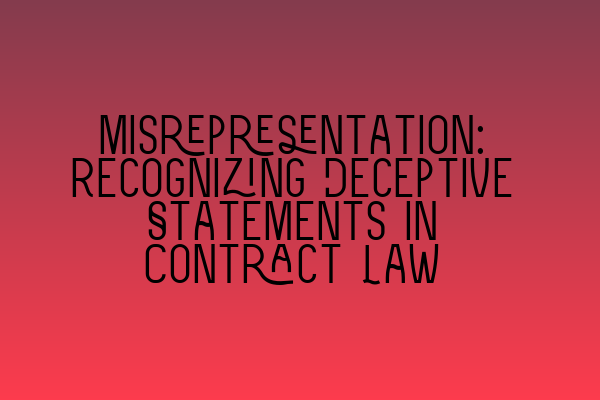Are you familiar with the concept of misrepresentation in contract law? If not, don’t worry! In this blog post, we will delve into what misrepresentation means, how to recognize it, and its implications in contract law.
Definition of Misrepresentation
Misrepresentation is a false statement made by one party in a contract that induces the other party to enter into the contract. The untrue statement can be in the form of an assertion, a statement of opinion, a conduct, or a non-disclosure of a material fact.
It’s important to understand that misrepresentation is different from a term or a warranty. A term is a statement that becomes a part of the contract, while a warranty is a promise made by one party to another. Misrepresentation, on the other hand, is a false statement that is used to deceive the other party into entering into the contract.
Recognizing Misrepresentation
Now that we know what misrepresentation is, let’s talk about how to recognize it. There are several key elements to consider when determining if a statement qualifies as misrepresentation:
- The statement must be false
- The false statement must be material
- The false statement must have led to the other party’s decision to enter into the contract
- The false statement must have been made by the party seeking to benefit from it
It’s essential to note that silence can also constitute misrepresentation under certain circumstances. If there is a duty to disclose certain information and one party fails to do so, it may be considered as a form of misrepresentation.
Types of Misrepresentation
Misrepresentation can be categorized into three types: innocent misrepresentation, negligent misrepresentation, and fraudulent misrepresentation.
Innocent Misrepresentation: This occurs when a party makes a false statement without knowing that it is false. They genuinely believe the statement to be true but later discover its falsity. In innocent misrepresentation, the remedy available to the other party is rescission of the contract.
Negligent Misrepresentation: Negligent misrepresentation happens when a party makes a false statement without reasonably believing it to be true. Unlike innocent misrepresentation, a claim for damages may be possible in cases of negligent misrepresentation.
Fraudulent Misrepresentation: This is the most serious type of misrepresentation. It involves a party intentionally making a false statement with the knowledge of its falsity, or with reckless disregard as to whether it is true or false. Fraudulent misrepresentation can lead to both rescission and a claim for damages.
Implications and Remedies
So, what happens when misrepresentation occurs in a contract? The innocent party has several potential remedies available:
- Rescission: The innocent party can ask the court to set aside the contract and restore both parties to their pre-contract positions. Rescission is the primary remedy for innocent and negligent misrepresentation.
- Damages: In cases of fraudulent misrepresentation, the innocent party can seek damages to compensate for any loss suffered as a result of entering into the contract.
- Other remedies: Depending on the circumstances and the jurisdiction, other remedies such as restitution, specific performance, or injunction may also be available.
Conclusion
Misrepresentation is a critical concept in contract law. It’s crucial to be able to recognize deceptive statements and understand the implications they can have on contractual relationships. By being aware of the types of misrepresentation and the remedies available, you can protect your interests in contractual agreements.
For more information on contract law and related topics, check out the following articles:
- SQE 1 Practice Exam Questions
- SQE 1 Practice Mocks FLK1 FLK2
- SQE 2 Preparation Courses
- SQE 1 Preparation Courses
- SRA SQE Exam Dates
Stay informed and protect your contractual rights!
